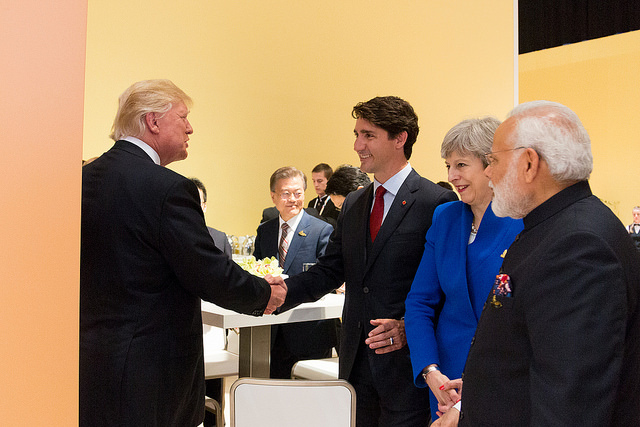
[RANT] Energy and trade: double trouble for Canada
Joe Terrett
Economy Industry Government Manufacturing Economy energy government manufacturing trade TrumpThe Trudeau government’s Keystone Cop management of the pipeline file does not inspire confidence in Canada’s energy sector.

Trump and Trudeau at the G20 meeting.
Photo: Shealah Craighead
In case you haven’t noticed, Canada is in a pretty tough spot on two fronts. On one hand, the reality show actor and US president Donald Trump has declared war on America’s formerly trusted northern neighbour. That would be us, folks.
Apparently, we, a tiny nation of some 36 million-odd souls, have managed to hornswoggle the world’s greatest superpower on trade, making us the target of his take no NAFTA prisoners tweet raging as the negotiation to refresh the three-way agreement approaches its endgame.
On the other hand, efforts to get oil sands production to tidewater from landlocked Alberta, thus reducing Canada’s reliance on discounted sales to our bellicose neighbour, have run aground following the Federal Court of Appeal overturning the Trudeau government’s approval of the Trans Mountain pipeline project.
Both hands represent troubling times ahead.
The Trudeau government can take credit for the pipeline fiasco. The federal court cited a flawed National Energy Board environmental assessment of how tanker traffic would impact BC’s coast, and Ottawa had not meaningfully consulted with the affected indigenous groups. The Liberals were critical of the Harper regime’s fast and loose treatment of the consultation process with indigenous/aboriginal groups and its quickie approach to environmental assessment. Lesson not learned. Now the project is set back for who knows how long.
Prime Minister Justin Trudeau, full of sunshiny optimism, has gambled he could balance fossil fuel to tidewater with a national carbon policy. He put all is chips on the Trans Mountain project after shutting out the Northern Gateway and wearing down TransCanada pipeline’s patience, leading to its abandonment of the proposed Energy East expansion. When Kinder Morgan got fed up with the political and legal uncertainties surrounding the Trans Mountain project, Ottawa took over, and will pay $4.5 billion for the privilege of holding the bag.
Trudeau has vowed the pipeline will be completed, but his determination isn’t reassuring. He will continue to face a hostile government in BC, opposition from green warriors who would like to see an end to all fossil fuel development, especially the oil sands, and aboriginal stakeholders who are now empowered by the Federal Court to throw their weight around.
Trudeau has also lost the confidence of a key ally. Alberta Premier Rachel Notley told Justin to stick his national carbon policy. And the Prime Minister can expect pushback from Saskatchewan and Ontario. So much for pipeline/carbon policy balance. Energy makes up about 10% of our GDP. Its development is key to Canada’s economy. The ongoing shenanigans and the Trudeau government’s Keystone Cop management of the pipeline file does not inspire confidence in Canada’s energy sector, where potential capital investment is on hold or cancelled. Business is looking for regulatory certainty, but not seeing it. Indeed, Suncor Energy won’t move ahead with additional crude production expansions until there’s physical progress on pipeline approvals, and Kinder Morgan is looking at unloading its Canadian assets.
Meanwhile, at this writing, Canadian and American negotiators are working furiously to bring Canada into the sneaky bilateral deal concluded during the final inning of summer between Mexico and US, as Trump fulminates on the sidelines, threatening Canada with a devastating 25% tariff on autos if the Trudeau government refuses to capitulate.
Whatever the outcome, America’s aggressive, confrontational and bad neighbour behaviour has taken the shine off Canada as a place to invest.
So, we are facing double trouble over an inability to get Alberta’s oil sands production to tidewater, and trade with our friends in the US. The Trudeau government will be challenged to restore waning business and investor confidence as these dramas unfold, or face unsavoury long-term economic consequences.
A version of this editorial appears in the September 2018 print version of PLANT Magazine.
